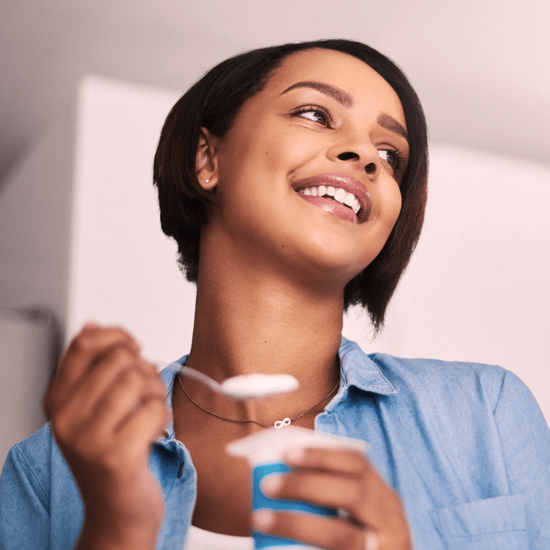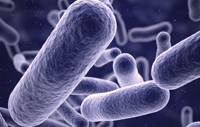
Last month we looked at trendy vitamins and dietary supplements like lutein and collagen. This month we’re shining our spotlight on probiotics, the health food phenomenon that’s worth more than $370 million a year and is projected to increase to $2.6 billion by 2024.
Probiotics are live bacteria and yeasts that help keep your gut healthy. They’re useful in replenishing your natural gut bacteria after you’ve taken antibiotics for a cold or infection. And, year-round, they’re a good way to keep your body functioning at its best.
The most common kinds of probiotics are lactobacillus (often found in yogurt and other fermented foods), Bifidobacterium (also found in dairy and may ease symptoms of irritable bowel syndrome or IBS) and Saccharomyces boulardii (a yeast that may fight diarrhea and other digestive problems).
Long story short, these and other probiotic critters help your gut more efficiently process the food you eat. They may also promote urinary and vaginal health, oral health and prevent allergies, colds and skin conditions like eczema.
Here are a few other facts and tips about probiotics:
· They’re not regulated by the FDA – probiotics are dietary supplements, not drugs, so they aren’t as strictly regulated and don’t go through the same rigorous testing.
· Side effects sometimes – you may develop gas or bloating for a few days when you first start taking probiotics. This is simply your body getting used to them.
· Probiotic foods – while yogurt is the food most commonly associated with probiotics, along with aged cheeses like cheddar and Parmesan, you can also find probiotics in pickles, sauerkraut, kimchi, tempeh and miso.
· Best before – probiotics are living and decay or die over time, so for the optimal effect, it’s best to eat or drink probiotic foods while they’re still relatively fresh.
· When can they be unsafe? Anyone with a weakened immune system, for example cancer patients, people who need heart valve surgery or are undergoing an organ transplant, should avoid probiotics because of a small risk of infection.
· Price points – at about $1 a dose, probiotics can be pricey but don’t be fooled into thinking more expensive varieties are better.
Probiotics are thought to be safe for most people but it’s a good idea to speak to your doctor or dietician before using them.
Do you take probiotics? What’s your favorite kind and how has it helped you? Share your experiences with the Shop Talk blog community forum!

Did you know? Move over, brain
The human body naturally contains about 3.5 lbs. of probiotic bacteria – more than the weight of your brain! In fact, there are 10 times more probiotics than cells in your body. (Source)

Good information. Thanks so much.
It gets confusing. You try to do what’s right for your health but then you hear conflicting stories and end up not doing anything at all.
For what it may be worth (and it might not be worth the paper to line the birdcage). There might be ten times as many probiotics in my body as there are cells in my body, but more needs an quantity and a dimension to mean anything, I have six dollars in my pocket. Sam has two dollars in his pocket. I have three times as many dollars in my pocket as Sam has in his pocket, but I have four (quantity) dollars (dimension) more in my pocket than Sam has in his pocket. I have four times one (quantity) dollar (dimension) more in my pocket than Sam has in his pocket. To say that I have ten times more probiotics does not have a quantity and dimension, and therefore makes no sense; to say that I have ten times thirty-seven point two trillion more probiotics than the thirty-seven point two million cells in my body does make sense, even though it is a bit awkward and convoluted.
I really need to start eating yogurt in the AM to see if it will help my gut!
Little things in your body that are important. I use yogurt to replenish the probiotics. I didn’t know it takes over 3 pounds of your body in probiotics.
Readable, concise and educative.
However it failed to mention probiotics in pill form; albeit, the form taken by many people on the go.
These are good. Reading about them was good. Shoppers view was good. Will use.
Last year after I had to do a colonoscopy my doctor put me on a Probiotic and the one that I like taking because it is cheaper than the brand name is Culturelle. It has helped not to have gas in my stomach.
I had never had done a colonoscopy until last year but I was put on the probiotics, dicylomene, and opramozole. After taking the Probiotic for a month I realized that my stomach was not so swollen and I was not always letting out gas.
I have been taking probiotics&probiotics consistently for the last 2 years..they have helped my lower my AC1, weight, LDL and my inflammation has drastically reduced. I have never felt better!!!! The products I take are Plexus Triplex combo! Contact me for more details on these amazing supplements!
I have not taken any of these but sounds like it could be helpful.